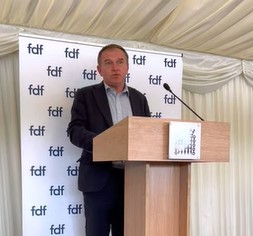In a speech to the Food and Drink Federation last week (13 July), Mr Eustice explained that he feels EPR as well as the deposit return scheme (DRS) “is the right direction to go in”.

However, he added he was keen not to risk rushing the legislation and see it unravelling later.
EPR for packaging was originally planned to be rolled out by 2023, but this was pushed back to 2024 earlier this year (see letsrecycle.com story).
Mr Eustice hinted at the risk of the legislation going wrong, warning that he will delay it if necessary.
“Everything we do in this world has an impact on the environment. We want to work closely with industry to try and drive changes on packaging and reduce the amount of packaging used,” he explained.
“I know there are concerns around EPR and even the DRS. My view on both is that they are the right direction to be going in but they are large and complex policies,” the environment secretary added
“At every step of the way, where I feel there is a risk, I am always willing to take a bit longer to get there and stage things in a sensible way so we don’t have a good policy with the right intention that comes unstuck because we have tried to rush it.
“I hope you would have seen that in the decisions I have taken to date, and we want to work with you in the future on that.”
Cost of living
Mr Eustice’s speech comes amid growing concern that the appetite for full EPR has lowered as the cost of living continues to bite.
The £1.1 billion cost of EPR is estimated to cost households £41 extra per year when rolled out, according to the government, on the basis of 85% of the costs being passed on. The cost is also likely to rise with inflation.
Any rise in household shopping bills unpopular with the candidates to be Prime Minister, with the cost of living crisis at the centre of most campaigns. However, some in the sector reason that the costs are just a case of moving money around as councils would see their costs reduced, although there is no guarantee that council tax would be reduced in parallel.
Consistency
The rhetoric from the Defra minister will dampen any hopes that responses to the consultations on consistency in household and business recycling in England and the DRS will be published before parliament heads for recess on 21 July.
MPs will not return until 5 September, when a new Prime Minister will be named, and the immediate focus will likely by on the leadership campaign.
The move is likely to frustrate local authorities, some of whom have been ramping up efforts to ensure they can comply with forthcoming legislation.
When EPR was pushed back to 2024 earlier this year, local authority groups warned that this could mean some councils can not make changes until 2030 (see letsrecycle.com story).
Consistent collections has an intrinsic link to consistency as large parts of the collection of packaging is supposed to be funded by producers.











Subscribe for free